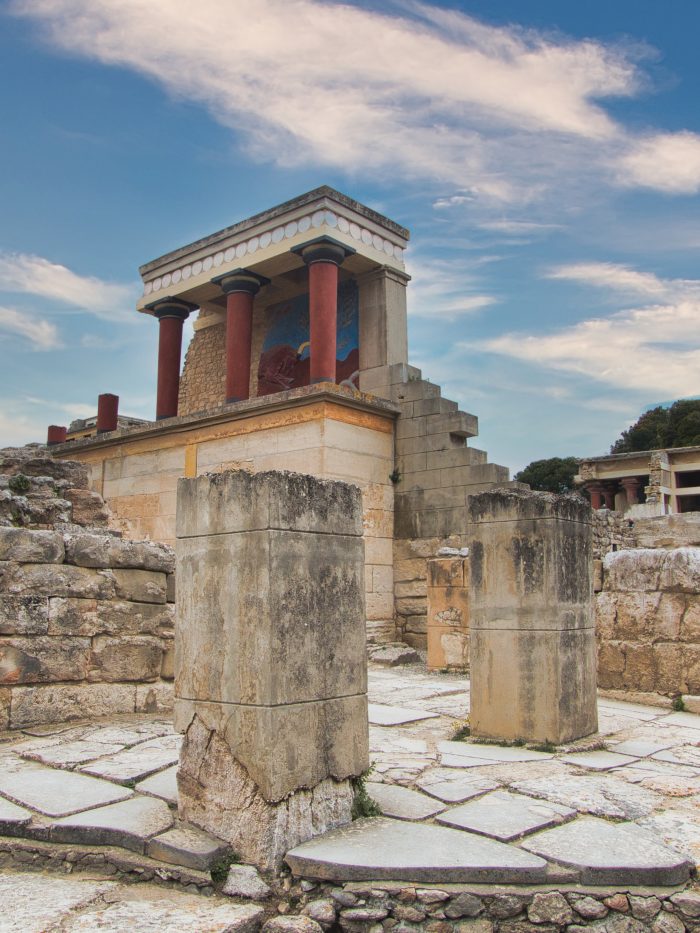Wordt een mens behouden door geloof alleen, of moet er nog iets bij? Dat was de vraag die in Jeruzalem besproken wordt tijdens ‘de eerste kerkvergadering’. Daar wordt vastgesteld wat de gemeente van God onderscheidt van enerzijds de joden en anderzijds de heidenen. Het korte briefje vanuit Jeruzalem naar Antiochië bevatte vier dingen die de gelovigen achter zich moesten laten. Joodse wetten en rituelen, alles wat met afgoderij te maken had, alle heidense vormen van de seksualiteit en een heidense leefwijze. Het zijn de dingen die destructief zijn voor een levend geloof waarin de Heer Jezus Christus centraal staat.
Those threats were there from the beginning and the apostles' letters in the New Testament are all about it. The glory of the Lord Jesus and the Gospel of God and what the threats are that can take that away from believers. Certainly even today.
It struck me the other day how extraordinary the first "church meeting" from Acts 15 actually is. Certainly there is much more to say about it than I can do in this brief sketch.
Antioch is a new church where people from Judaism and from paganism came to faith. But the "former Pharisees" taught that believers from the Gentiles had to be circumcised and keep the law. Without that, they could not even be saved, they said (Acts 15:1,5). That was quite a threat!
But it was so incredibly wrong, that Paul and Barnabas fought this to the utmost, not only in Antioch, but all the way to Jerusalem. Peter delivers a speech there and concludes with: "We believe by the grace of the Lord Jesus Christ to be saved in the same way as they" (15:11).
This is an interesting statement because he reverses the statement of the "former Pharisees". Peter says that people from among the Jews are saved in the same way as people from among the Gentiles; namely, by faith alone. Therefore, that is the only criterion by which a person belongs to Christ and is part of the church.
But that is not all, for believers from the Gentiles are also given another message. They must leave behind certain customs and attitudes they were accustomed to as "Gentiles.
Jakobus houdt daarom nog een rede waarin hij de gelovigen uit de heidenen vraagt – of wellicht beter: opdraagt – om de dingen uit hun oude leven ver achter zich te laten. Het ging om de dingen die te maken hebben met afgoderij, hoererij en het nuttigen van niet-geslachte dieren en van bloed.



What the Jew must leave behind
The idea "do this and you will live" is so deeply ingrained in the Jews that they find it hard to let go. You must obey the law, the rules so that you earn eternal life. But God had not given the law for that. After all, through it they had to come to the realization that a man can in no way meet God's standards and cannot himself add anything to his eternal salvation. But through the law they had to discover that in order to then take refuge in faith in the Lord. Then they would discover that the Lord is merciful and they could live in faith with Him, certain of the salvation that the Lord God would grant them.
(Also read here about the faith of the Old Testament believers).
Peter had already learned these things from the Lord Himself (Acts 10 and 11). In Jerusalem, he testified to this : "So God has also given to the Gentiles the conversion that leads to life" (Acts 11:18).
Rules for unity?
Yet there is another aspect to this and that is that "rules" - even when set by God Himself - always create separation. All Christian denominations use rules and opinions, whether written down or not and whether or not based on Biblical data, to determine who belongs to the community and who does not. It is very understandable and there are all kinds of arguments to be made for it. But that is human thought. For applying rules or standards - as biblical as it may sound - does precisely what it is not meant to do. It divides believers and hinders the very unity that should be there.
In addition, for believers, rules or obligations mean that they follow them "because they have to. As a result, faith comes to depend on how well one follows the rules. But meanwhile, this stifles the real life of faith. While it is precisely God's intention that in dealing with Him and His Word we be taught by Himself and grow in the knowledge of Him.
The church, then, is a community where each has a living faith, a living relationship with the Lord Jesus. That same new life - Christ Himself - in which the Spirit of God is at work, binds believers together. That Spirit produces fruit that can in no way be brought about by law, duty or precept (Galatians 5:22-23).

From the beginning, this was a clear principle: there are no set rules or conditions for belonging to the church of God. Nor was that what bound believers together. Only a living faith was necessary.
So how do you recognize your brothers and sisters?
It is important to consider how the unity of believers was established in the first Christian communities. How do you recognize the other person, who claims to believe, when he or she comes from a completely different background than you? The first Christians also struggled with this, which is why these histories are so valuable because they show us something of how they recognized each other at that time.
What stands out in chapters 1 through 14 of the book of Acts is that always the Word of God, the Gospel, is preached. That is always the first thing: people are called to repent to God and believe in the Lord Jesus Christ. For that is the only way to be "saved," to receive forgiveness of your sins and assurance of eternal salvation. Those who were converted received the Holy Spirit, both Jew and Gentile. This was visible in what they did: they made God great and told what He had done to them. In the process, there was great joy among those who had become believers.
One might say that the circle of the first believers is characterized by:
- ... the forgiveness of sins they have received through faith in Christ Jesus,
- ... to which they give testimony,
- ... their faith established on the Word of God,
- ... the Holy Spirit they have received as a seal from God,
- ... by which they magnify God and honor the Lord Jesus
- ... and joy characterizes their faith.
- ... love and care for others, especially their fellow believers near or far.
From the beginning, these have been the characteristics and this has not changed in all the centuries since. It is the new, spiritual life present in believers that makes them recognize one another as children of God, as brothers and sisters of the same family of God.
(For this, see also here about the characteristics of rebirth.)
You can put this another way: believers have come to know Christ the Crucified as the center and main focus of their personal lives and recognize that He is also the center of their common life. The Christian congregation revolves around Him alone.
What the pagan must leave behind
Maar dat betekent niet dat in de gemeente ‘alles maar kan’. Wanneer een heiden – bijvoorbeeld een Griek– tot geloof in Christus komt, behoort hij vanaf dat moment tot de gemeente van de Heer Jezus Christus. Maar ook hij moet zich realiseren dat hij vanuit het heidendom niets mee mag nemen in zijn nieuwe leven en in de christelijke gemeente.
In the meeting in Jerusalem, at the initiative of James, it is stated that believers from the Gentiles must abstain from "idolatrous sacrifices, the eating of blood, and of the choked, as also whoredom" (Acts 15:29).
But this is not the first time the Bible speaks of these topics. For the same topics the Lord also put before His people Israel. In Leviticus 17 and 18, He very emphatically instructed them to keep far away from these things.
- To begin with in Leviticus 17:1-9, where it talks about idolatry. The people were allowed to offer sacrifices to God - they were even prescribed in this same book of the Bible, but they were not allowed to do it in a pagan way, so they would have fellowship with demons (verse 7).
- Daarna komt in hoofdstuk 17:10-16 het verbod om bloed te eten, ook niet van een gevangen dier, waaruit het bloed niet was weggelopen.
- Finally, in Leviticus 18, the Lord speaks to the people of Israel that they are not to adopt the sexual practices of the Gentiles (Egypt and Canaan). "You must not defile yourselves with all these things, for the Gentile nations whom I am going to drive out before you have defiled yourselves with all these things." (Leviticus 18:3 and 24).
We see that here in Acts 15 the believers from the Gentiles are called to keep away from exactly the same things. Apparently the believers from the Jews already knew these things and took them with them into their Christian life.
What does this mean for the Christian today?
Te vrezen valt dat deze dingen de tegenwoordige christenen niet zoveel meer zeggen. Vroeger heb ik geleerd – en lang gedacht – dat afgoderij die dingen zijn ‘die tussen jou en God instaan’ en dat je onthouden van bloed betekende dat we ‘geen bloedworst mogen eten’. Nu denk ik dat dit op zich geen verkeerde opvattingen zijn, maar het laat veel van wat werkelijk bedoeld is onder de radar verdwijnen.
Because these are things that both the people of Israel and also the church of Christ had to keep far away from. Then they are "not little things," so to speak. They are the things by which Satan, God's adversary, apparently wants to deceive God's people in all times and draw them away from the Lord God. Therefore, it is absolutely necessary to discover what these things mean, even for believers anno 2023.
Below we follow the order mentioned in Acts 15:20.
- The things tainted by idols
Anything to do with idolatry was objectionable to God's people. Our God wants to be served and we may draw near to Him. But only in the way He Himself makes it clear in His Word. Our God is the Invisible One, and of all times the believer must approach God in faith. In faith, not in "beholding" because we cannot perceive Him with our senses. We humans cannot experience Him physically in any way.
When most Christians today believe that they can experience God, they do not realize that their experiences come from demons. It is what the Bible calls idolatry, the most serious evil for which God's wrath comes upon you.
From everything that has to do with idolatry we must stay far away; that was true for Israel and it is still true today, also for the church of God.
Deze opvatting is op deze site uitgebreid gedocumenteerd. (Zie elders op deze site bijvoorbeeld hier en hier https://goddienen.nu/afgoden-dienen/afgoden-dienen/ , https://goddienen.nu/afgoden-dienen/afgoderij-in-de-christenheid/).
Idolatry has several ill effects and one of them is that the distinction between good and evil becomes blurred and morality disappears. Ultimately, evil is called good and good is called evil; the reversal of God's standards.
- Fornication
Closely related to idolatry is sexual rampantness. The Lord God intended sexuality as a gift for husband and wife in a lifelong relationship of marriage. But people who serve idols do not (er)know the God-given boundaries. Similarly, when the people of Israel fell into idolatry, there was an immediate impact of an increase in immorality. This is the case in all times up to our time, including in Christendom.
The word used in Acts 15:20 is porneia, waarmee alle onwettige seksuele omgang aangeduid is. Daarom meen ik dat we rustig mogen zeggen dat hiermee alle seksuele omgang buiten het huwelijk tussen man en vrouw wordt bedoeld.
For many in our time, this is a harsh message. Yet the message sent by the apostles to Antioch is crystal clear and exactly in line with what the Lord had said to His people Israel in Leviticus. Specifically, it means that a believer knows what God's views on marriage and sexuality are and his or her life will be marked by them.
- The strangled and the blood
With the strangled and the blood, it may be a little more difficult. At least, I make an attempt to understand what this is about and make a few suggestions.
For the people of Israel, eating blood and choking was forbidden (see Leviticus 17:10-16). Apparently these were things that were deadly normal in the pagan world. The Lord says this about it in verses 11 and 14:
“For the life of the flesh is in the blood, and I have given it to you upon the altar to make atonement for your souls; for it is the blood that makes atonement for the soul. (...) for it is the life of all flesh. Its blood sustains its life."
De Here verwijst hiermee ongetwijfeld naar Leviticus 16, het voorgaande hoofdstuk. Het jaarlijkse ritueel van de Grote Verzoendag had tot doel dat het volk van God zich ieder jaar opnieuw zou realiseren dat verzoening nodig was. Iets waar ze zelf niets aan konden bijdragen: ‘een dag van volledige rust, opdat u uzelf verootmoedigt’ (Leviticus 16:31). Het niet eten van het verstikte en het bloed moest hen er steeds – bij wijze van spreken dagelijks – aan herinneren dat ze hun leven aan de Here te danken hadden. Het zou hen bewaren voor een levenswandel die de Here onwaardig was.
Thus, we too will be aware of the great - one-time - work of atonement of our Savior and Lord. We live our lives with Him in awareness of the grace that has been proven to us. We do not live for ourselves, but for Him and "through faith in the Son of God, who loved me and gave Himself up for me" (Galatians 2:20). Our lives are no longer characterized by "the will of the Gentiles" but by "the will of God" (1 Peter 4:2-3). Our life is no longer characterized by the things of the world: 'the lust of the flesh, the lust of the eyes and the pride of life' (1 John 2:16).
In short, a believer who has a living relationship with the Lord Jesus will have a lifestyle that is consistent with it and by which "God is glorified in all things through Jesus Christ" (1 Peter 4:11). He has left behind the lifestyle of the world.
The glory of Christ
In Acts 15, we see that the church of Jesus Christ is made up of believers who come from both the Jews and the Gentiles. God makes no distinction between them because they have received the same beatific faith and from God the same Holy Spirit. Moreover, by faith their hearts have been cleansed so that each can have a personal relationship with the Lord and experience the grace of the Lord Jesus Christ in life (read Acts 15:8,9,11).
Dat is de kern van het christenleven; dat is waar het steeds om moet gaan. Dat is ook waar God de Vader en onze Heer Jezus Christus het meest door verheerlijkt worden. Zoals de Heer het gezegd heeft: “this is eternal life, that they may know thee, the only true God, and Jesus Christ, whom thou hast sent” (Johannes 17:3).
How fitting that in that same prayer the Lord Jesus says the following about the unity of those who belong to Him:
“En Ik bid niet alleen voor dezen, maar ook voor hen die door hun woord in Mij zullen geloven, opdat zij allen één zullen zijn, zoals U, Vader, in Mij, en Ik in U, dat ook zij in Ons één zullen zijn, opdat de wereld zal geloven dat U Mij gezonden hebt. En Ik heb hun de heerlijkheid gegeven die U Mij gegeven hebt, opdat zij één zijn, zoals Wij Eén zijn; Ik in hen, en U in Mij, opdat zij volmaakt één zijn en opdat de wereld erkent dat U Mij gezonden hebt en hen liefgehad hebt, zoals U Mij hebt liefgehad” (John 17:20-23).
Only Christ glory is what makes up the unity of God's children.
It goes without saying that Satan aims his arrows at this in order to ultimately destroy the church of God. The apostles recognized these threats and instructed the fledgling church to keep far away from them:
- Do not impose obligations or rituals on believers
- also abstain from the things that had to do with idolatry, immorality and pagan lifestyle.
The special unity of the Bible
When you make it 15th chapter of Acts you may wonder if such a short bill was now sufficient for the church of Christ. Of course the apostles everywhere preached the gospel, founded churches and taught. Along with other believers like Judas and Silas in Antioch.
De ‘opdracht’ vanuit Jeruzalem
is elaborated and explained in
all the letters of the New Testament.
they are about
the glory of Christ and the Gospel,
The dangers of legalism,
Of idolatry, immorality and the pagan lifestyle.
Fortunately, we have the teaching of the apostles in the New Testament letters. It struck me only recently that all those letters are perfectly in line with the teaching of Acts 15. In all the letters together we are taught about the Gospel and the glory of Christ, about not introducing "the law," and about avoiding pagan influences.
Wat dat betreft zijn de brieven van het Nieuwe Testament de perfecte toevoeging op de brief van de gezamenlijke apostelen uit Jeruzalem. In de brieven worden al deze dingen uitgewerkt en toegelicht. Ik denk dat je rustig mag zeggen dat ze met elkaar de ‘leer van de apostelen’ (Handelingen 2: 42) vormen die in het begin nog slechts mondeling, maar later schriftelijk werd onderwezen.
How perfect is the Word of God. Surely it will bring us to admiration if even in this simple little blog we may again see something of how God's thoughts are still the same. That which threatened Israel also threatens the church, is specifically named by the apostles 2,000 years ago, then expressed by them in multiple ways and now covers most of the New Testament!
Who still dares to say that the Bible is not the Word of the One True God?
Related articles
Wat de Bijbel afgoderij noemt – https://goddienen.nu/afgoden-dienen/afgoden-dienen/
De gevolgen van afgoderij voor de ziel van de mens – https://goddienen.nu/gevolgen-voor-de-ziel/
Afgoderij in de christenheid – https://goddienen.nu/afgoden-dienen/afgoderij-in-de-christenheid/
Wat de Here God het liefste wil – https://goddienen.nu/god-dienen/
De kern van het christenleven – https://goddienen.nu/en/serving-god/the-core-of-your-christian-life/
De gemeente is geen menselijk bouwwerk – https://goddienen.nu/god-dienen/over-de-christelijke-kerk/een-dwaze-kerk/
Over de leer van de apostelen – https://goddienen.nu/god-dienen/over-de-christelijke-kerk/een-dwaze-kerk/de-leer-van-de-apostelen/

